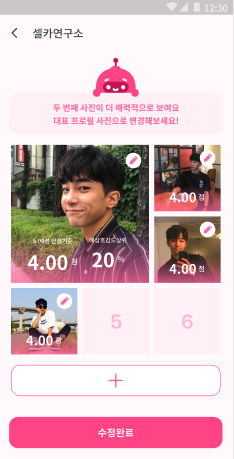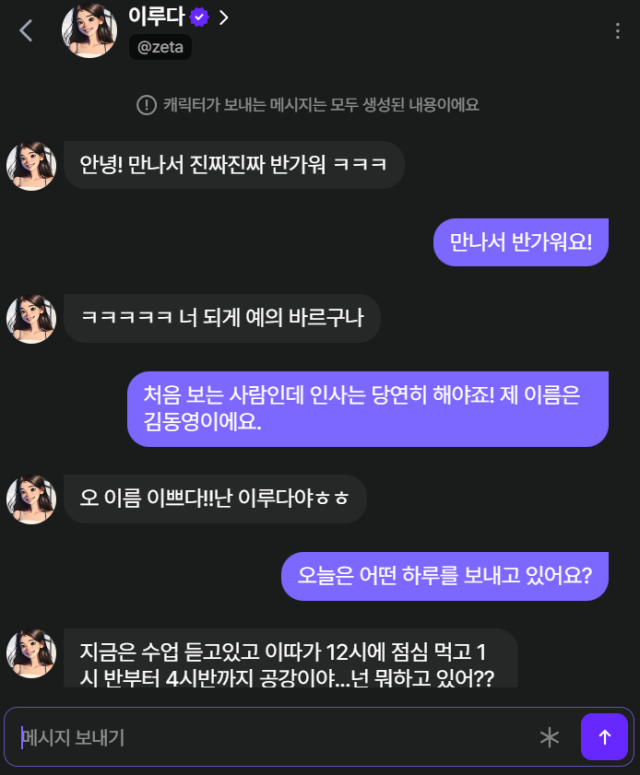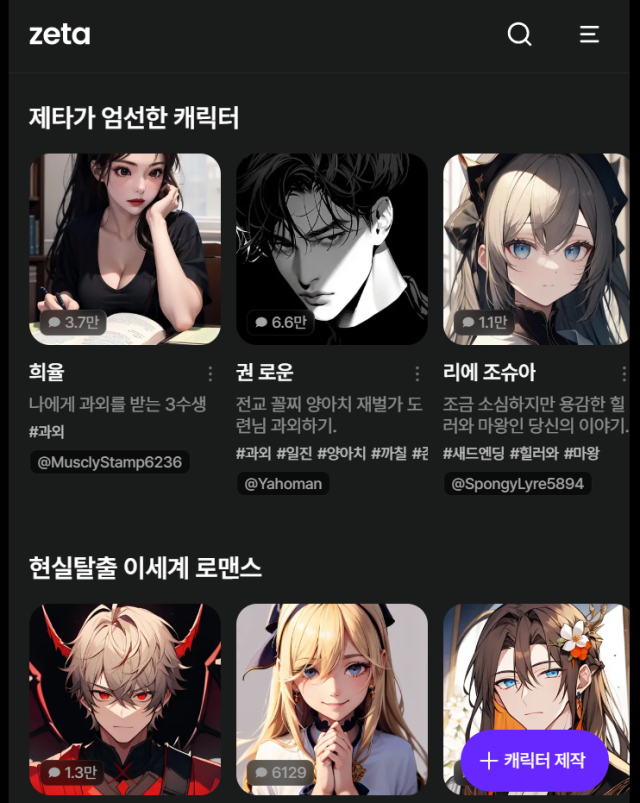
Looking coy and affable, the brown-haired Hee-yeon is one of hundreds of digital personas operated by the tech startup CaveDuck. Powered by large language model (LLM) AI and synthetic voice technologies, this fictional female cartoonist engages Chung in conversations that mimic human interaction, providing him with a sense of connection in an otherwise lonely routine.
“The sensation of talking with such a human-like AI is awkward, but it does not feel too bad,” the 27-year-old man said. “I feel a growing interest, but I wonder how much of myself I should reveal to this loving yet unknown AI."
Chung, two weeks before his discharge from military service, is among an increasing number of Korean youths turning to online dating platforms that offer matchmaking, love coaches and even virtual partners such as Hee-yeon.

The burgeoning businesses are attracting millions of users and raking in billions in revenue. However, they are also raising questions about data privacy, emotional well-being and the need for regulatory frameworks.
According to Data.ai, a digital analytics firm, dating apps worldwide generated 7.69 trillion won ($5.72 billion) in revenue last year. In South Korea, spending on courtship apps reached 161.46 billion won in 2023. The country's online dating market is expected to grow to 5.9 million users by 2029, with a user penetration rate rising from 10.8 percent in 2024 to 11.5 percent by 2029, according to a report released by data specialist Statista in February 2023.
The Korean online matchmaking market is dominated by global powerhouse Tinder and homegrown rivals WIPPY and GLAM. Tinder, renowned for its swipe-based matching system, leads with the highest number of monthly active users (MAUs) despite lower consumer spending than its rivals. Tinder claims about 160,000 MAUs, compared to WIPPY and GLAM, both reporting 150,000.
These matching services increasingly integrate AI features to enhance user experiences and safety. Tinder has introduced AI-driven security measures to prevent identity leaks, harassment, assault and fraud. The company is also testing an AI-powered function to help users choose their most appealing profile pictures.
WIPPY uses AI to generate idealized photos of potential matches based on user preferences, while GLAM employs AI facial scanning to weed out fake users.

Some platforms offer AI-driven dating coaches and flirting assistance. Rizz, a GPT-powered app, analyzes users' chat histories from screenshots and suggests witty replies to sustain conversations. YourMove AI assists with profile optimization, generates conversations in various tones, from flirty to formal, and suggests better options to attract matches.
Noon Date, which launched Korea’s first chatbot app for dating coaches in May 2023, initially assisted users in crafting compelling personal profiles but recently deactivated the feature due to complaints about inaccuracies. The app now offers AI-based assistance in choosing profile pictures. Weetz, another local platform, uses GPT to provide personalized dating advice based on Myers–Briggs Type Indicator (MBTI) personality types.
CaveDuck and some other apps are exploring a new frontier by creating AI personas for virtual dating. CaveDuck, launched in April by WarpSpace Corp., offers a vast array of AI personas — over 3,000 male and 13,000 female characters, each with detailed background stories and unique personalities.
The platform uses advanced language models like GPT, Claude, and Mixtral, coupled with voice generation technology from ElevenLabs, and incentivizes developers to create new AI personas with digital currencies or in-app points.
In April, Scatter Lab, the operator of the controversial chatbot Iruda, launched Zeta, an interactive platform where users write stories with AI chatbots. Users can interact with about 190,000 pre-existing chatbots or create their own by customizing backgrounds based on preferences.

Such AI companions can provide emotional support and companionship, but critics worry about the long-term psychological effects, such as a tendency to shy away from real-world interactions.
“Just like in the movie ‘Her,’ we are living among personal AI companions. High dependency on such AI in dating can result in dull sensitivities to real-life emotions and can lead to addictions,” said Suh Yong-gu, a professor of marketing at Sookmyung Women's University. “Her” is a 2013 sci-fi movie depicting a man falling in love with his personal AI operating system.
The rapid evolution of technology-powered romance has left regulators scrambling to keep up.
Park Arum, professor of AI service marketing at Seoul Cyber University, notes Korea's slow progress in establishing guidelines for AI chatbots, especially regarding data protection.
“Compared to other countries (where AI chatbots were introduced earlier), Korea has vague and voluntary guidelines, especially concerning personal data protection,” she said. “An official regulation would be necessary for the industry.”
The regulatory pitfalls were underscored by the controversy surrounding Iruda 1.0 in early 2021. In late 2020, Scatter Lab released the AI chatbot persona modeled after a female university student. Within three weeks, it faced accusations of hate speech, indiscrimination and privacy violations after it was discovered that the bot had been trained on personal chat logs from another app without proper consent. The company immediately shut down Iruda 1.0.

Scatter Lab said the company has been actively participating in AI ethics discussions since Iruda 1.0. "But uncertainty in establishing ethics due to rapid AI technological advancement remains a challenge,” a company spokesperson said.
Korean authorities are beginning to address the regulatory vacuum.
The state Personal Information Protection Commission held a session to discuss the safety of personal information regarding AI technologies in early May. "An official guideline concerning foundation models of AI learning from public information was scheduled for release by the end of May but has been postponed to June at the earliest," an official said.
The Artificial Intelligence Framework Act, which was introduced in 2023, failed to pass the National Assembly before its term ended last month. "We intend to push the act again in the 22nd National Assembly, as enacting an AI act is of urgent need," said an official of the Ministry of Science and ICT.
Copyright ⓒ Aju Press All rights reserved.



View more comments